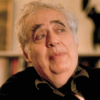Harold Bloom

Harold Bloom
Harold Bloomis an American literary critic and Sterling Professor of Humanities at Yale University. Since the publication of his first book in 1959, Bloom has written more than 20 books of literary criticism, several books discussing religion, and a novel. He has edited hundreds of anthologies concerning numerous literary and philosophical figures for the Chelsea House publishing firm. Bloom's books have been translated into more than 40 languages...
NationalityAmerican
ProfessionTeacher
Date of Birth11 July 1930
CountryUnited States of America
The art and passion of reading well and deeply is waning, but [Jane] Austen still inspires people to become fanatical readers.
I have never believed that the critic is the rival of the poet, but I do believe that criticism is a genre of literature or it does not exist.
It is hard to go on living without some hope of encountering the extraordinary.
To read in the service of any ideology is not, in my judgment, to read at all,
...the Bible itself is less read than preached, less interpreted than brandished. Increasingly, pastors may drape a limply bound Book over the edges of the pulpit as they depart from it. Members of the congregation carry Bibles to church services; the paster announces a long passage text for his sermon and waits for people to find it, then reads only the first verse of it before he takes off. The Book has become a talisman.
We read to find ourselves, more fully and more strangely than otherwise we could hope to find.
Indeed the three prophecies about the death of individual art are, in their different ways, those of Hegel, Marx, and Freud. I don't see any way of getting beyond those prophecies.
Shakespeare will not make us better, and he will not make us worse, but he may teach us how to overhear ourselves when we talk to ourselves... he may teach us how to accept change in ourselves as in others, and perhaps even the final form of change.
Read deeply, not to believe, not to accept, not to contradict, but to learn to share in that one nature that writes and reads.
People cannot stand the saddest truth I know about the very nature of reading and writing imaginative literature, which is that poetry does not teach us how to talk to other people: it teaches us how to talk to ourselves. What I
Aesthetic value emanates from the struggle between texts: in the reader, in language, in the classroom, in arguments within a society. Aesthetic value rises out of memory, and so (as Nietzsche saw) out of pain, the pain of surrendering easier pleasures in favour of much more difficult ones ... successful literary works are achieved anxieties, not releases from anxieties.
The most beautiful prose paragraph yet written by any American.
We read, frequently if not unknowingly, in search of a mind more original than our own.
I realized early on that the academy and the literary world alike